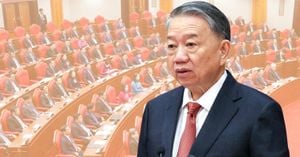UK Prime Minister Sir Keir Starmer is preparing to advocate for Ukraine's sovereignty during his upcoming discussions with US President Donald Trump, amid burgeoning tensions around the peace negotiations between the US and Russia, which have so far sidelined Ukrainian leadership. Starmer, who recently engaged with Ukrainian President Volodymyr Zelensky, described their conversation as 'productive'—reflecting on the necessity of ensuring Ukraine's security during his imminent visit to Washington.
During their call, Starmer emphasized the UK’s 'ironclad support' for Ukraine and stressed the imperative of including Kyiv at the negotiation table for any discussions meant to end the conflict initiated by Russia. This plea arises after Trump controversially labeled Zelensky as a 'dictator' and insinuated criticisms about European efforts to end the war, claiming they 'haven't done anything.'
Starmer's impending talks with Trump are seen as pivotal, especially following Trump's remarks at the Conservative Political Action Conference where he posited, 'we’re pretty close to a deal,' framing the conflict as one demanding immediate resolution. The stakes are high since any poorly negotiated peace could jeopardize Ukraine's territorial integrity and future security.
Zelensky has made it clear; Ukraine will not accept any peace resolution without their participation. 'There can be no discussion about Ukraine without Ukraine,' he asserted, spotlighting concerns over being sidelined from discussions about their own fate. Consequently, Starmer committed to making the case against sidelining Zelensky during talks with Trump, reinforcing the notion of Ukraine as 'a democratically elected leader.' The Prime Minister's determination appears to echo sentiment from European allies, who have publicly condemned Trump’s recent remarks.
During discussions with European leaders, including Ursula von der Leyen of the European Commission, Starmer stressed the necessity for Europe to 'step up' its support for Ukraine. This sentiment reflects widespread recognition of Ukraine's crisis as not just local but central to European security interests, particularly as Russia continues to infringe on Ukraine's sovereignty with aggressive military actions.
Meanwhile, as the situation continues to evolve, the UK government is under pressure to increase its defense spending. Starmer is expected to lay out plans for raising the UK's defense budget to 2.5% of GDP, aiming to bolster security commitments recognized as necessary by both the US and NATO. Given the growing calls for the UK to uphold its commitments to NATO, Little has been detailed publicly about how the transition to higher spending will occur, but it’s clear the potential for conflict escalation weighs heavily on these discussions.
Echoing the urgency of these strategies, past statements from Zelensky resonate. He suggested he would be willing to trade his presidency for NATO security guarantees, emphasizing the importance of long-term security for Ukraine. This astonishing offer highlights the precarious nature of Ukraine’s current position, not merely fighting for survival but striving for substantive international backing to deter future threats from Russia.
With recent drone strikes by Russia on Ukrainian territory signaling continued aggression, it is palpable how delicate the balance of peace discussions is becoming. These challenges underline the criticism aimed at Trump's approach to negotiations—specifically, how his engagements with Moscow may alienate Ukraine. The Ukrainian government's firm stance against unilateral decisions made by Western powers resonates with calls from European leaders seeking to realign cooperation toward support for Ukraine.
Additionally, discussions are occurring across various levels of government about reevaluations of past proposals, which include contentious negotiations over Ukrainian rare earth minerals as reparations for US support. Zelensky dismissed previous requests for Ukraine's mineral wealth as repayment to the US for military aid, reinforcing sentiments pointing to the need for equitable agreements moving forward.
At the heart of the matter remains the continuing bombardment of Ukraine, with recent military escalations leading to devastating losses among civilians and military personnel alike. The air force reported over 200 drone strikes and multiple ballistic missile launches, drawing stark reminders of the humanitarian crisis at play.
These events culminate on the world stage as leaders grapple with the reality of diplomatic relationships redefined amid war. Starmer’s trip to Washington carries the weight of transatlantic relations, European solidarity, and, most critically, the security of Ukraine itself. All eyes will be on whether discussions can pivot to genuine commitments rather than speculative agreements, ensuring Ukraine's voice is not merely heard but situated firmly at the center of negotiations.
Looking forward, the balance of power hinges on these discussions—where mistakes could lead to catastrophic outcomes for Ukraine and its allies. Sir Keir Starmer must confront the challenging dynamics shaped by unpredictable rhetoric under Trump and the broader geopolitical stakes at play as he navigates this complex situation.



